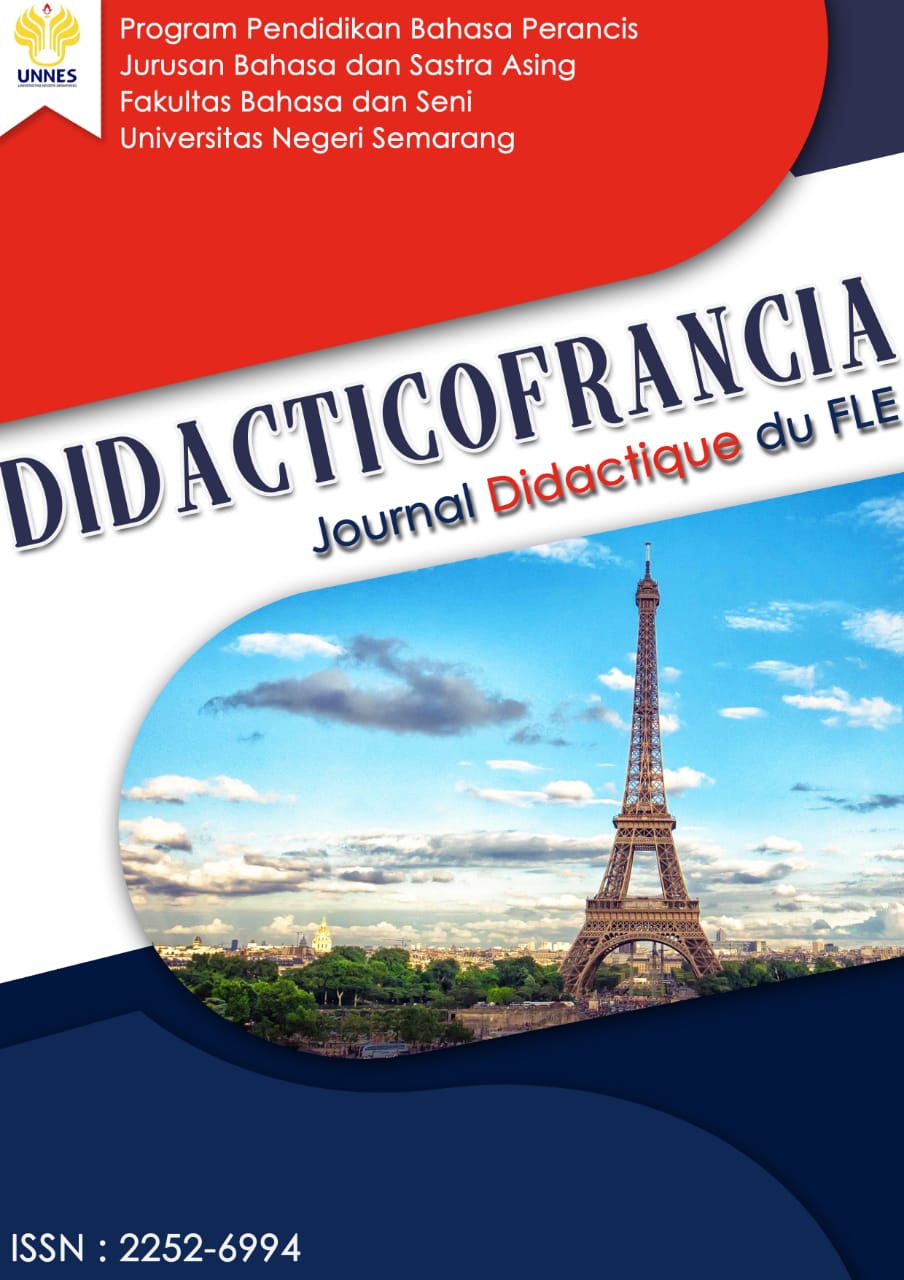La Difficulté De Parler Français Pour Les Volontaires Non Francophones À L'association Vir ‘volt Et Les Facteurs Qui L'entendent
Abstract
Abstract
Le but de cette recherche est de décrire les difficultés des volontaires non francophones et les facteurs causaux dans l'expression orale. Toutes les données ont été obtenues par questionnaire puis analysées de manière descriptive après avoir été classées en aspect apparenté et la population de cette recherche était de 17 volontaires. Pour collecter les données, l'auteur a utilisé un questionnaire ouvert pour mesurer les difficultés des volontaires et les facteurs qu'elles entraînent dans la performance orale. Le résultat de cette étude a montré que les volontaires avaient des difficultés dans leurs capacités d'élocution, en particulier (1) Timide ; (2) Difficulté à traiter la parole; (3) Barrières linguistiques ; (4) Emploi de l'accent régional; (5) Prononciation du français qui est difficile ; et (5) Peur de faire des erreurs. Tandis que pour les facteurs qu'il provoque, à savoir, (1) Inhibition ; (2) Rien à dire; (3) Moins de participation ; (4) Ils ont tendance à penser dans leur langue maternelle. En raison des difficultés et des facteurs de causalité ci-dessus, de nombreux étudiants n'étaient pas vraiment bons à parler. En conclusion, les étudiants ont rencontré des difficultés dans la performance orale, de sorte qu'ils ont du mal à maîtriser les compétences orales.
Abstract
The aim of this research is to describe the difficulties of non-francophone volunteers and factors its cause in speaking performance. All the data were obtained through questionnaires and then analysed descriptively after being classified into related aspect and the population of this research was 17 volunteers. To collect the data, the writer used an open questionnaire to measure the volunteers' difficulties and the factors it causes in speaking performance. The result of this study showed that the volunteers had difficulties in their speaking abilities, particularly (1) Shyness; (2) Difficulty in processing speech; (3) Linguistic barriers; (4) Use of regional accent; (5) Pronunciation of French which is difficult; and (5) Fear of making mistakes..
References
Brown, H. D. 2004. “Teaching by Principles an Interactive Approach to Language Pedagogy.” Longman.
Bygate, (2008) Tasks in second language learning. Basingstoke: Palgrave Macmillan.
J.M. Saputra, (2019). An Analysis the Difficulties Factors of Students’ Speaking Performance at the Ninth Grade of Islamic Junior High School Masmur Pekanbaru.
Littlewood, W. (2007). Communicative Language Teaching. Cambridge: Cambridge University Press.
Luoma, S. (2004). Assessing speaking. Cambridge: Cambridge University Press. https://doi.org/10.1017/CBO9780511733017
Richard, Jack C., and Willy A. Renandya. 2002. “Methodology in Language Teaching: An Anthology of Current Practice.” Cambridge University.
Sugiyono. 2015. Metode Penelitian Pendidikan: Pendekatan Kuantitatif, Kualitatif, dan R&D. Bandung: Alfabeta.
Tuan, Nguyen H., and Tran N. Mai. 2015. “Factors affecting students’ speaking performance at Le Thanh Hien High School.” Asian Journal of Educational Research 3 (2): 8-23.
Ur, Penny. 1991. A Course in Language Teaching. Cambridge: Cambridge University Press.
Urrutia and Vega.(2010).Encouraging Teenagers to Improve Speaking Skills through Games in a Colombian Public School. PROFILE Vol. 12, No. 1, 2010. ISSN 1657- 0790. Bogotá, Colombia. Pages 11-31.
Zhang, Y. 2009. “Reading to Speak: Integrating Oral Communication Skills.” English Teaching Forum, no. 47, 32-34. http://files.eric.ed.gov/fulltext/EJ923446 pdf.









